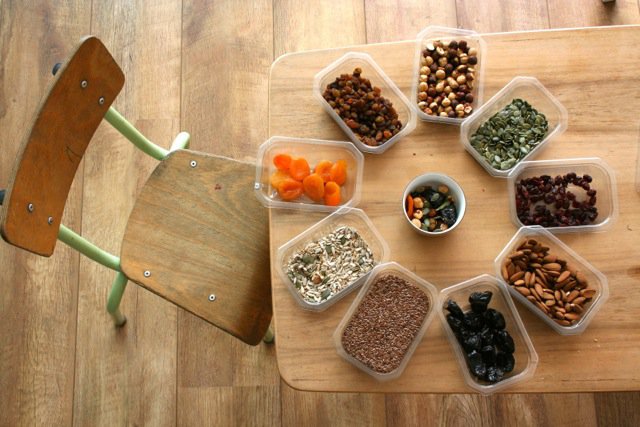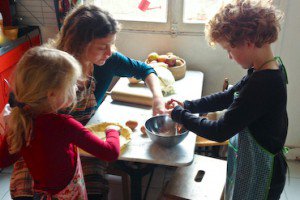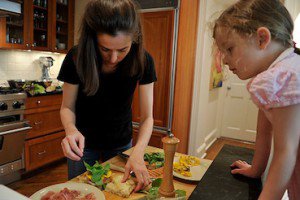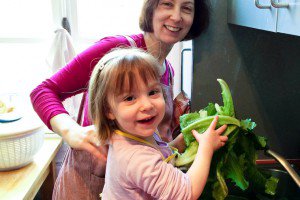Lucy Baluteig-Gomes is the French designer behind Rose la Biche, a poetic line of handmade clothing that’s both easy to wear and one-of-a-kind — think petals cascading from collars, ruffled hoodies, and tulle neckpieces.
Lucy and I have known each other for years — we first met at a C&Z get-together in San Francisco in 2006 — and I have followed her adventures excitedly as she moved from San Francisco back to Paris, before relocating to Barcelona where she lives now. Lucy is a mother of two, and I am delighted to have her as my new guest on the Parents who Cook series.
I have two kids: my son Oscar is 6 years old, and my daughter Brune is 3. While they have two very different personalities, they get along very well and are very protective one of another.
Oscar is sweet and sensitive, calm and responsible. He’s sociable and like to make people laugh. He cannot stand injustice. We like to joke that he’ll win the Nobel Prize for Peace one day.
Brune is a lively little girl, playful and full of energy, with a strong personality. She has quickly understood that a smile can get her almost anything she wants, and she uses this trick as much as she needs!
Did having a child change the way you cook?
Not really. Once the baby phase was over, I quickly made a point of cooking the same meal for the whole family. First because it’s more practical, but also because I cherish mealtimes very much — that’s my conservative side.
We talk about the meal, the vegetables or spices we’re eating, we comment on whether we like them or not, and then we chat about everyone’s day. I like that time when we’re all gathered around the table, and my husband and I try our best to make it happen on weekdays, even if it means eating late.
Plus, I come from the Southwest of France, a region where food is taken very seriously, and in my family, cooking is almost a religion. In the end, I might have slightly modified some of my recipes to make them more kid-friendly (like preparing fish into fishballs) or quicker (like a great 9-minute risotto in the pressure cooker). But all in all, I didn’t really change the way I cook.
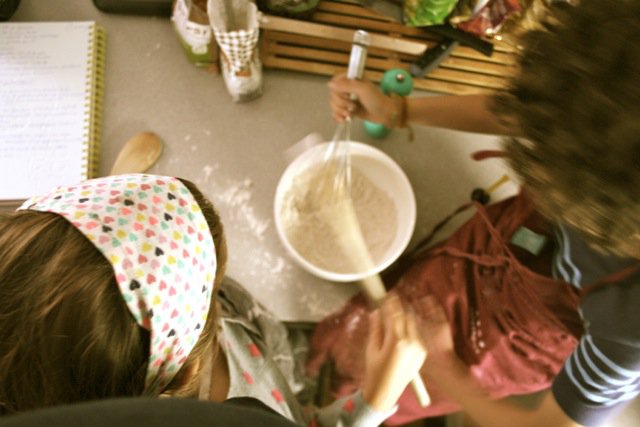
Do you remember what it was like to cook with a very young child? Any tips or saving grace for new parents going through that phase?
Like many new mothers I’m sure, two tools have made my life much easier: a Babycook and a blender. With the Babycook, all you need to do is cut up fresh vegetables, add some meat or fish if you want, and voilà, 15 minutes later, dinner’s ready! I loved the fact that I could cook fresh meals every day for my baby.
I remember that at that time, I ended up making a lot of vegetable purées for my husband and me, too, something I didn’t think of doing as much before: sweet potatoes, celery, broad beans… so good. I used to do a lot of fruit purées as well, and froze portions for those days I was short of time.
With the blender, I made fruit smoothies every morning for my son: combined with oatmeal instead of milk, babies love them. I remember that when I needed to give my children jarred baby food from the supermarket, they wouldn’t eat it. I guess I gave them “bad” habits!
Over time, have you developed staple dishes or strategies that make it possible to prepare a meal and keep the kids happy at the same time?
Because I work from home, I make my own hours, so I have time to cook dinner everyday, and I try to really make the most of that precious time. In order to cook properly for about 20-30mn, I usually let my kids watch television. That’s the deal between us : cartoons vs. free time for me to cook.
I always have some pre-cut vegetables in the fridge, that is definitely a time-saver. I also always have pre-made tart crust for those days when I don’t feel like cooking. I put together a quiche with whatever leftovers I have, and try to mix in some puréed vegetables (a great way to “hide” the vegetables kids sometimes refuse to eat like spinach, brocoli, or pumpkin).
I also have that super easy, super fast recipe my kids love and beg for : zucchini velouté. Two zucchinis cooked for 10 minutes in boiling water with a cube of chicken stock. Once cooked, I mix everything with a wedge of Laughing Cow cheese (or a spoonful of cream cheese) and there you have it: an amazing soup kids love.
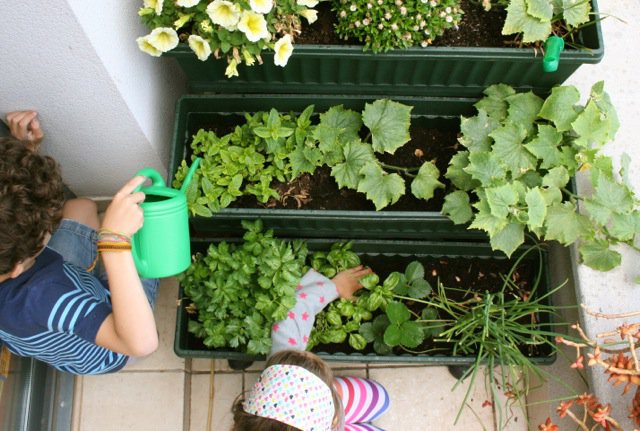
Have you found ways to involve your children in the cooking process?
At home, I’ve never really had to make an effort to get them involved. I guess cooking is so important to me that it tickled their curiosity, and they naturally joined me in the kitchen, asking to help with the cooking. I never say no, and they end up giving me a hand with dinner every day, even it it’s just to bring dishes to the table.
I like to cook with them on weekends, sweet things like crêpes or cakes, and they’re always so proud to say, “I’ve made it myself!” They also love putting on their apron, and I use that to reinforce the solemnity of it: “You’re wearing an apron, so you’ve got a serious part to play in this kitchen.”
Oscar is big on making cheesecakes. Brune loves to play with spoons to pour sugar or flour. I recently bought a cookbook for kids and we try to make something new every weekend.
Another thing I care a lot about is making them taste cuisines different from mine. We like to explore new restaurants with my husband and always go there as a family: the kids try spring rolls, thai skewers, sushi, tacos, phô, papadam, curry or massala. We talk about the countries where these specialties come from, and check where that is on our globe when we get home.
I also take them with me to the greenmarket and they help me choose fruits and vegetables, check how ripe they are, or discuss ideas of salads we could make. It’s a great way to make them aware of what they eat and what is on their plate.
A few months ago, we traveled to Brazil for a vacation, and the kids were blown away by the tour of the local market: the stallholders had them try all kind of fruits they’d never seen before, and they loved it. Now they beg me for passion fruits! So I also try to find new fruits here to taste with them. They love this sense of discovery and adventure.
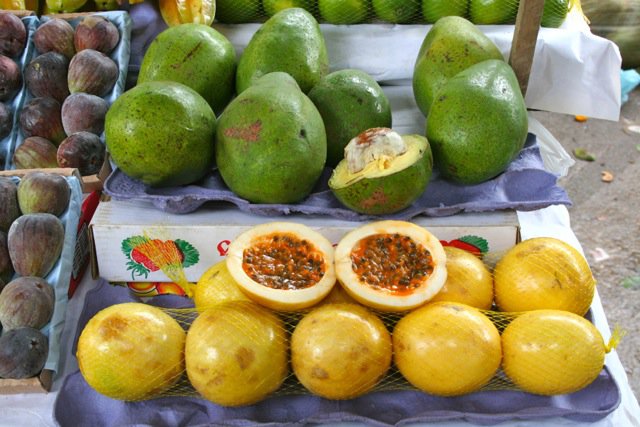
As someone who’s passionate about food, can you talk about the joys and challenges of feeding your children, and how you go about teaching them to be happy, adventurous eaters?
I encourage them to taste everything and I praise them when they do. My motto is, “You don’t have to like it but you should taste it.” My son is keen on the idea, while my daughter is less curious. But I never force her.
If she refuses to eat something, I don’t say anything, but the next time I cook that same ingredient again, I’ll put some on her plate. I explain it’s OK to have a little bit on her plate, she can do whatever she wants with it — take it or leave it. She usually ends up tasting it after a few attempts. I try to make it feel like a game rather than an obligation.
I’ve also offered them seeds, nuts, and dried fruits from an early age. [Note: Nuts are a potential choking hazard and aren’t recommended until age 2 or 3, depending on the source. Even then, be sure to cut them into small pieces that can’t obstruct the airway.] So when they come home from school or ask for a snack, I give them a mix of squash seeds, sunflower seeds, sesame seeds, hazelnuts, almonds, sultanas, prunes, figs, or apricots. Served in a pretty little bowl, they absolutely love it. I’ve found out not many of their friends are used to eating these — I’m so happy I introduced them to the beauty of these natural treats.
The only real reluctance they have left is with fresh herbs: they are definitely much less adventurous with those. The solution I’ve found is to plant a small vegetable garden on our terrace. Every day, one of them is in charge of watering them and cutting some basil, mint, or chives for dinner. They’re invited to snip their own over their plate, and it turns out they love it!
